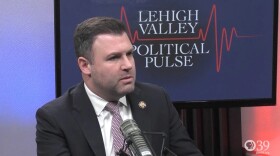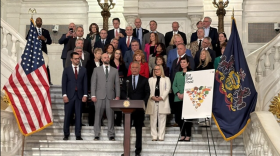-
“Bucks County is not a county that needs or wants a detention facility,” the county’s lone Republican commissioner said.
-
More than 200 Allderdice students joined the protest Wednesday afternoon, chanting "abolish ICE" and other slogans. Meanwhile, across the city line in Wilkinsburg, parents and observers kept watch for immigration officers as students were dismissed from two schools there.
-
At least for now, Pennsylvania's Josh Shapiro and other governors will be no-shows for an annual event this month, one that traditionally has been a bipartisan gathering of governors at the White House. Just last year, Shapiro said the gathering helped break an impasse over federal funding earmarked for the state.
-
U.S. Rep. Ryan Mackenzie defended expanded immigration enforcement under the Trump administration while acknowledging the need for reforms after recent incidents involving federal agents, during an interview marking his first year in office.
-
The National Weather Service says precipitation is expected to taper off between 11 p.m. tonight and 4 a.m. Monday morning, but more snow could fall across Northeast Pa. on Monday.
-
As Immigration and Customs Enforcement ramps up detentions and deportations in major cities, people in Western Pennsylvania are curious to learn about what they can do as bystanders.
-
Food was the focus of U.S. Health and Human Services secretary Robert F. Kennedy Jr.'s Wednesday visit to Harrisburg, but many Pennsylvania Democrats used the trip to push back on his other health policy positions, including a recent rescheduling of childhood immunizations.
-
U.S. Health Secretary Robert F. Kennedy Jr. visited the state Capitol on Wednesday to promote new federal nutrition guidelines that encourage Americans to eat more protein, whole-fat dairy products and vegetables.
-
Consumer advocates and a Pennsylvania public utility commissioner are urging state lawmakers to tax data centers and other large energy users to help lower residents' energy bills.
-
A panel of state policymakers at a hearing at the Pennsylvania Farm Show Complex on Thursday appeared in near-unanimous agreement on the need for statewide regulation of the intoxicating hemp industry.
-
Pennsylvania farmers and agricultural experts spoke at a public hearing in Harrisburg Wednesday, saying they're dealing with a mental health crisis and need more support from the state.
-
Starting today there are are eight counties in northwestern Pennsylvania without a hospital where a person can give birth. Warren County is the latest addition to the region's expanding maternity care desert.















